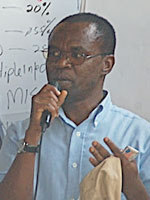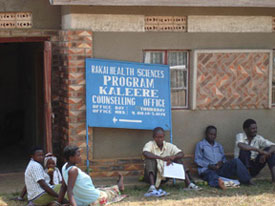Preventing HIV in Uganda
July / August 2012 | Volume 11, Issue 4

Photo courtesy of
Fred Nalugoda
Fred Nalugoda
On his first visit to the Rakai district in western Uganda, Fred Nalugoda was horrified by the numerous worn-out people he saw wandering listlessly around, open sores evident, and being shunned by all. "I got chills and thought I could not go back," he said.
Nonetheless, Nalugoda decided to return and make a difference in these sick people's lives. He joined
Rakai Health Sciences Program, which conducts extensive community epidemiologic and behavioral studies in HIV/AIDS and related topics. In 1999, he received his master's degree under Johns Hopkins University's Fogarty AIDS International Training and Research Program (AITRP).

Photo courtesy of Johns Hopkins University
He says skills in demography and biostatistics have enabled him to collect, manage, analyze and interpret data and get his studies published. His mentorship experience has given him the blueprint he uses to mentor others. He is now program director responsible for all field studies and is highly regarded for his deep knowledge of the Rakai communities.
He has been involved in many key Rakai trials, including the landmark study that found male circumcision was a highly effective barrier to HIV transmission. Although Uganda has been relatively slow at promoting the procedure, not least due to limited resources, the proportion of circumcised men in Rakai is about 55 percent, he said, double the previous level.
There are also notable changes in other areas of HIV prevention, Nalugoda noted, a remarkable change from two decades ago. "Regarding this disease, it is close to 100 percent awareness, even in young children," he said. "They know about strategies for prevention and stigma has been reduced very much. Now HIV treatment and prevention is widely available and denial is not a big issue now, especially in Rakai."
More Information
To view Adobe PDF files,
download current, free accessible plug-ins from Adobe's website.